2013版初中英语全程复习方略课件(教材复习案)七年级上册 Modules 1-5(外研版)(共56张PPT)
文档属性
| 名称 | 2013版初中英语全程复习方略课件(教材复习案)七年级上册 Modules 1-5(外研版)(共56张PPT) |
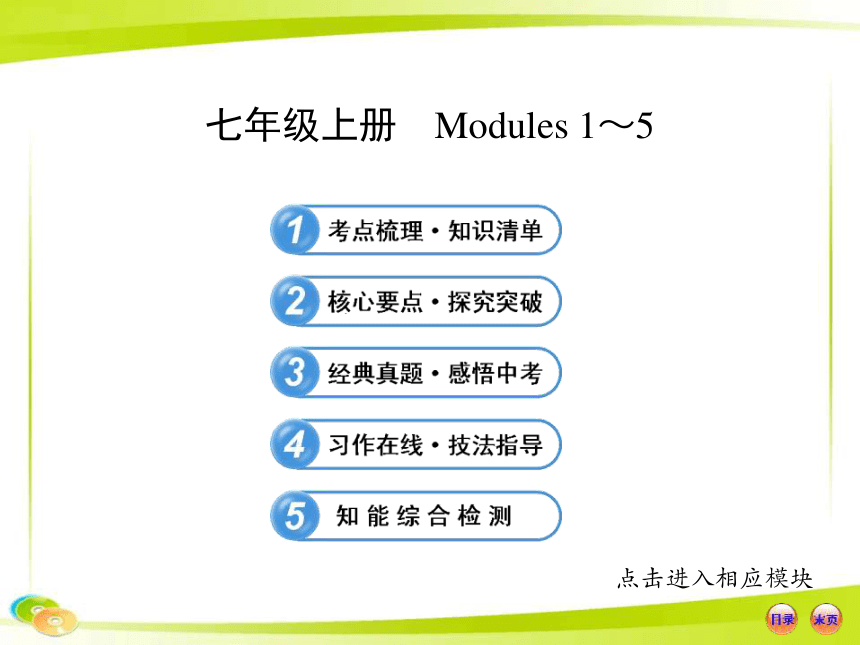
|
|
| 格式 | zip | ||
| 文件大小 | 1.3MB | ||
| 资源类型 | 教案 | ||
| 版本资源 | 外研版 | ||
| 科目 | 英语 | ||
| 更新时间 | 2014-03-01 00:00:00 | ||
图片预览

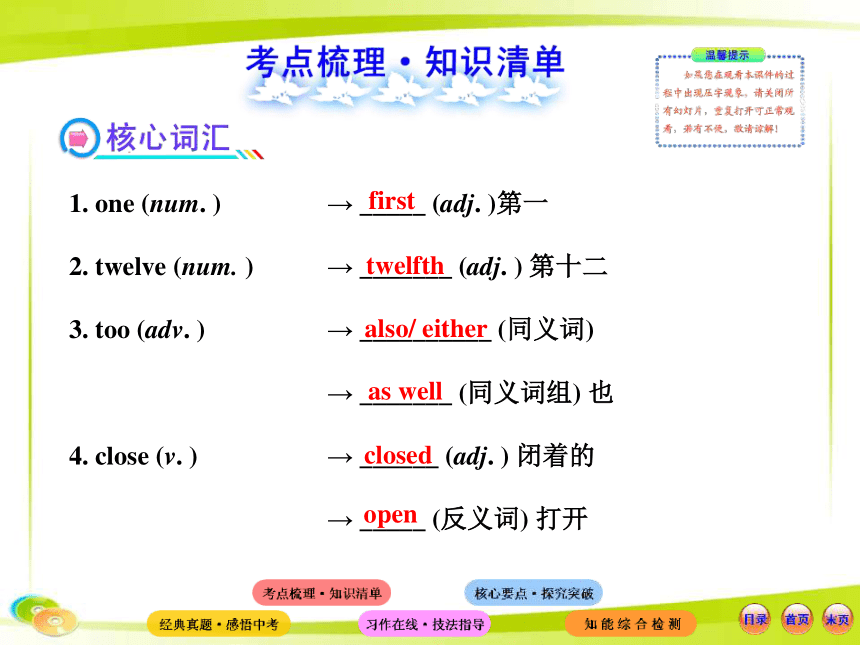
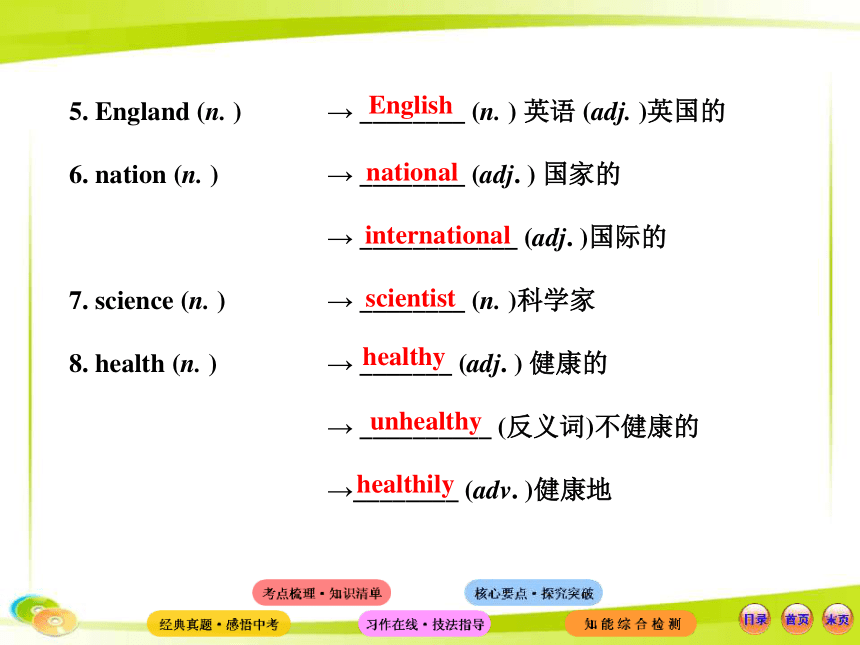
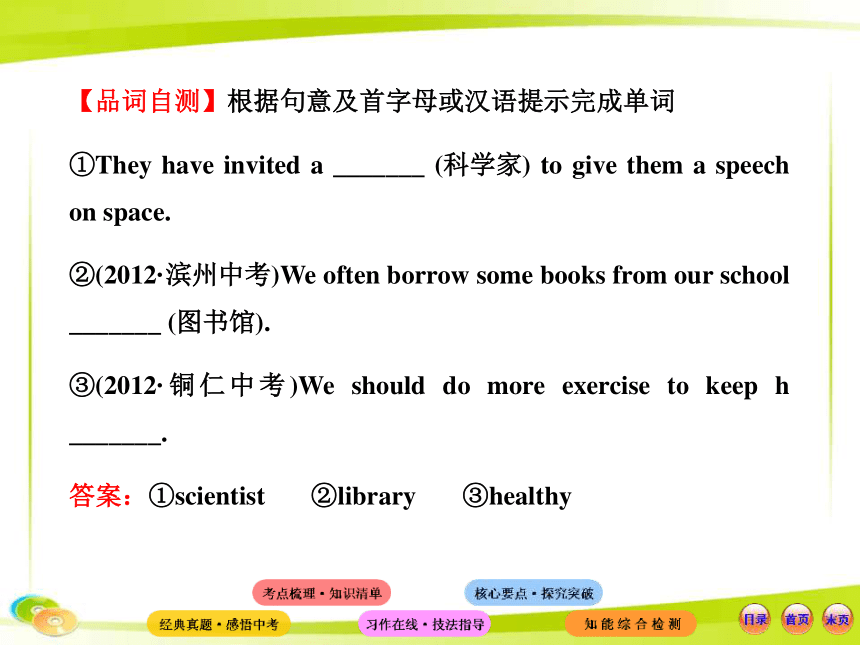
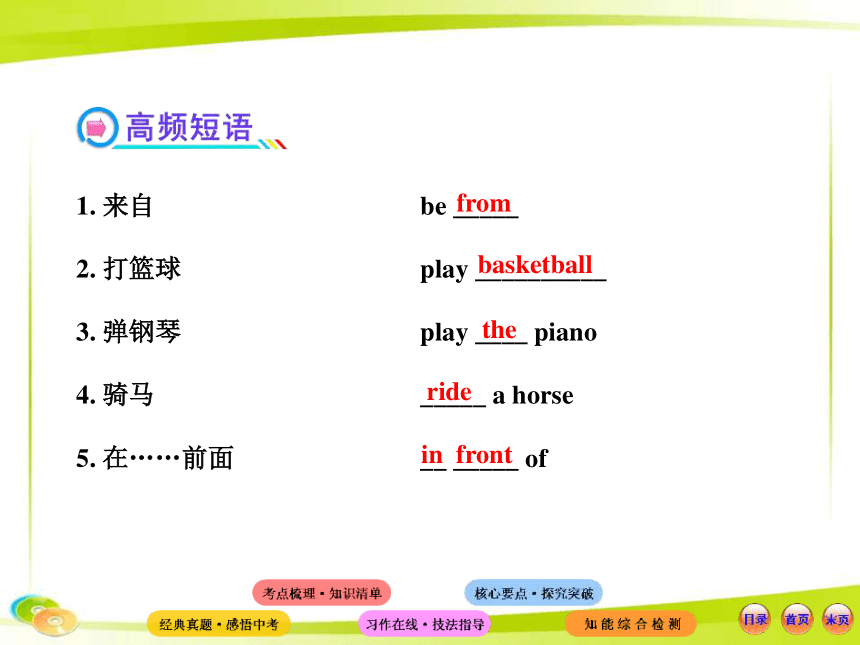
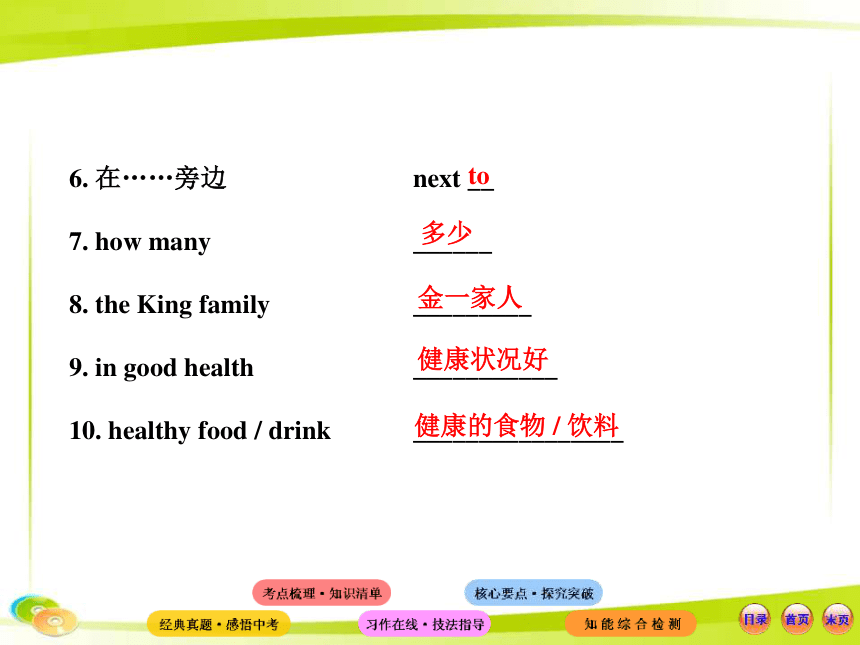
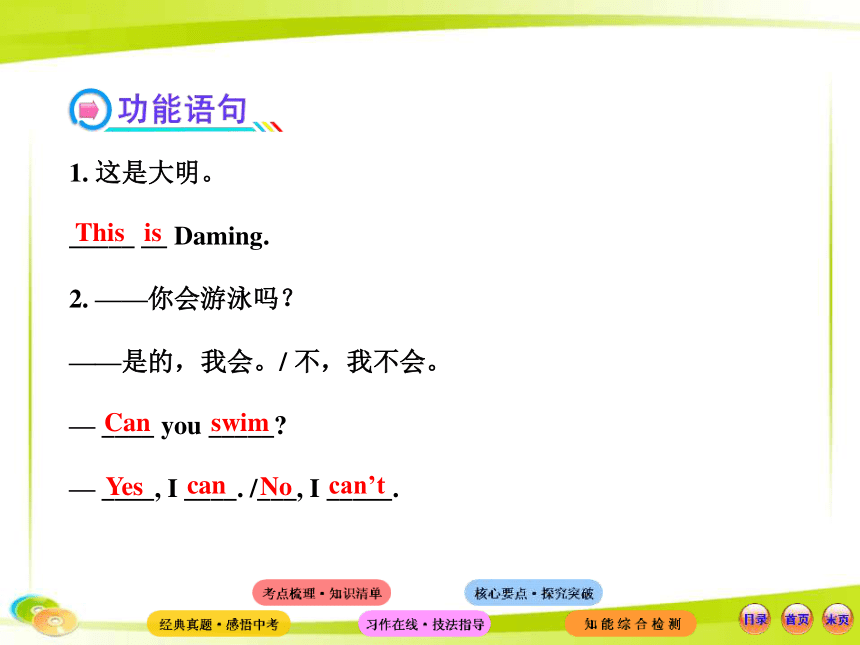
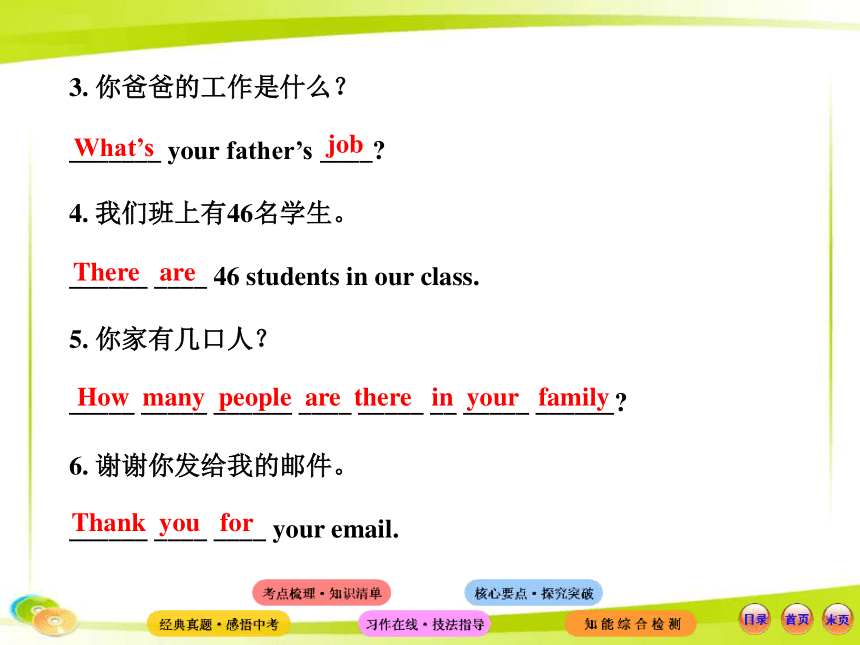
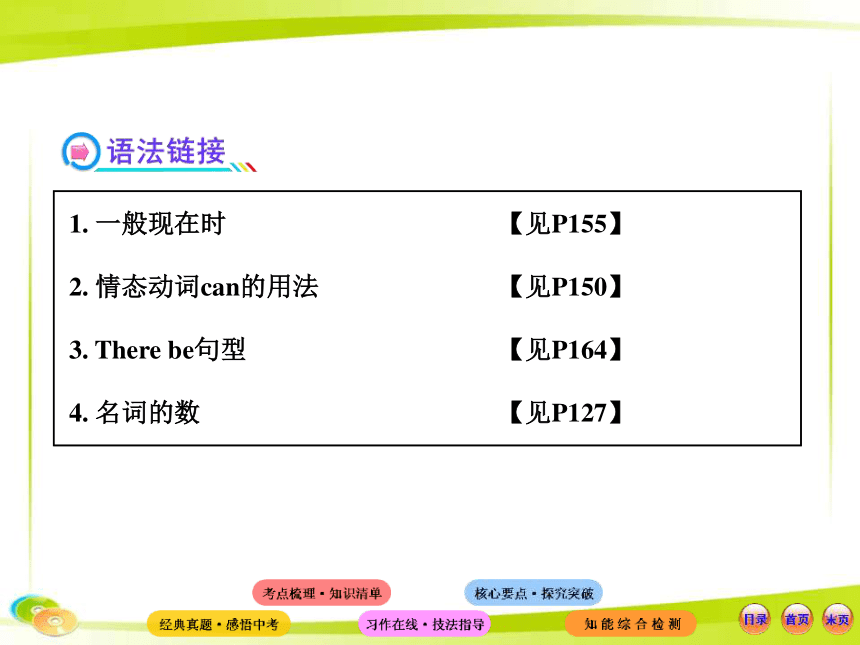
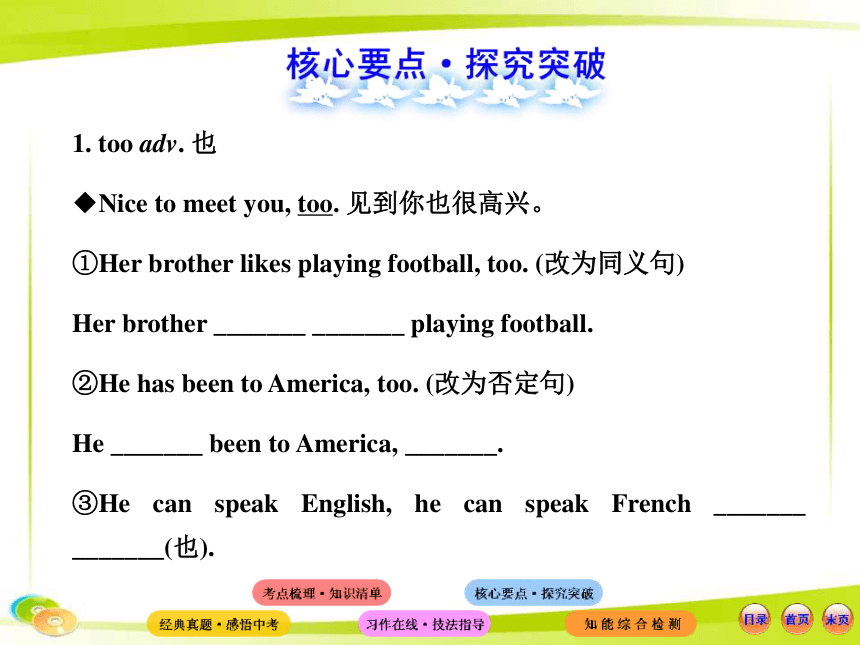
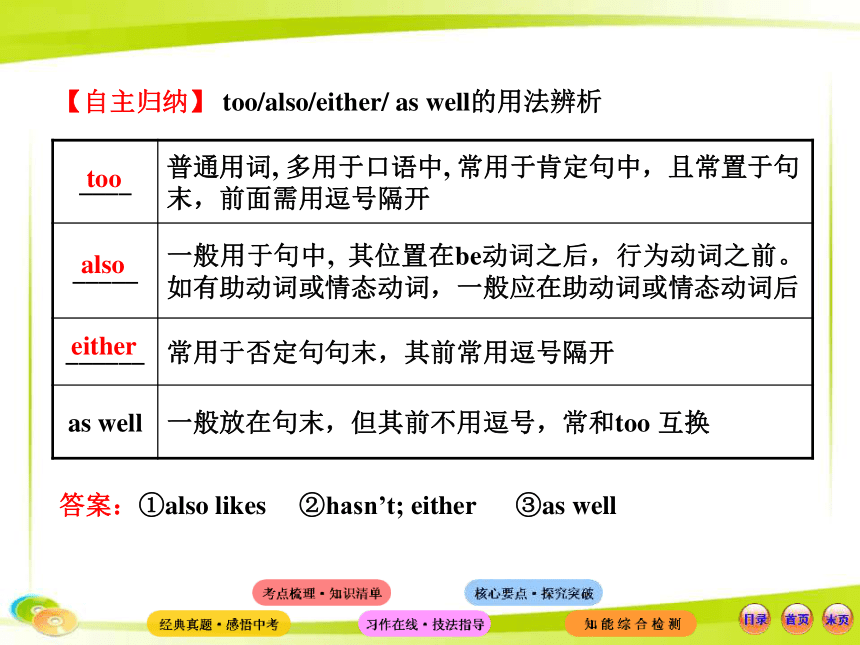
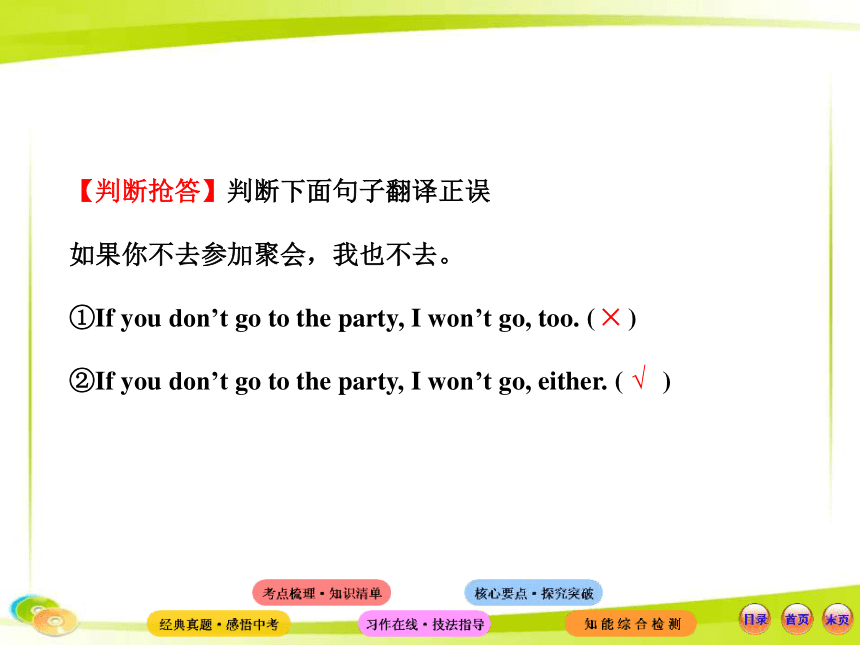
文档简介
(共56张PPT)
七年级上册 Modules 1~5
1. one (num. ) → _____ (adj. )第一
2. twelve (num. ) → _______ (adj. ) 第十二
3. too (adv. ) → __________ (同义词)
→ _______ (同义词组) 也
4. close (v. ) → ______ (adj. ) 闭着的
→ _____ (反义词) 打开
first
twelfth
also/ either
as well
closed
open
5. England (n. ) → ________ (n. ) 英语 (adj. )英国的
6. nation (n. ) → ________ (adj. ) 国家的
→ ____________ (adj. )国际的
7. science (n. ) → ________ (n. )科学家
8. health (n. ) → _______ (adj. ) 健康的
→ __________ (反义词)不健康的
→________ (adv. )健康地
English
national
international
scientist
healthy
unhealthy
healthily
【品词自测】根据句意及首字母或汉语提示完成单词
①They have invited a _______ (科学家) to give them a speech on space.
②(2012·滨州中考)We often borrow some books from our school _______ (图书馆).
③(2012·铜仁中考)We should do more exercise to keep h _______.
答案:①scientist ②library ③healthy
1. 来自 be _____
2. 打篮球 play __________
3. 弹钢琴 play ____ piano
4. 骑马 _____ a horse
5. 在……前面 __ _____ of
from
basketball
the
ride
in front
6. 在……旁边 next __
7. how many ______
8. the King family _________
9. in good health ___________
10. healthy food / drink ________________
to
多少
金一家人
健康状况好
健康的食物 / 饮料
1. 这是大明。
_____ __ Daming.
2. ——你会游泳吗?
——是的,我会。/ 不,我不会。
— ____ you _____
— ____, I ____. /___, I _____.
This is
Can
swim
Yes
can
No
can’t
3. 你爸爸的工作是什么?
_______ your father’s ____
4. 我们班上有46名学生。
______ ____ 46 students in our class.
5. 你家有几口人?
_____ _____ ______ ____ _____ __ _____ ______
6. 谢谢你发给我的邮件。
______ ____ ____ your email.
What’s
job
There are
How many people are there in your family
Thank you for
1. 一般现在时 【见P155】
2. 情态动词can的用法 【见P150】
3. There be句型 【见P164】
4. 名词的数 【见P127】
1. too adv. 也
◆Nice to meet you, too. 见到你也很高兴。
①Her brother likes playing football, too. (改为同义句)
Her brother _______ _______ playing football.
②He has been to America, too. (改为否定句)
He _______ been to America, _______.
③He can speak English, he can speak French _______ _______(也).
____ 普通用词, 多用于口语中, 常用于肯定句中,且常置于句末,前面需用逗号隔开
_____ 一般用于句中, 其位置在be动词之后,行为动词之前。如有助动词或情态动词,一般应在助动词或情态动词后
______ 常用于否定句句末,其前常用逗号隔开
as well 一般放在句末,但其前不用逗号,常和too 互换
【自主归纳】 too/also/either/ as well的用法辨析
答案:①also likes ②hasn’t; either ③as well
too
also
either
【判断抢答】判断下面句子翻译正误
如果你不去参加聚会,我也不去。
①If you don’t go to the party, I won’t go, too. ( )
②If you don’t go to the party, I won’t go, either. ( )
×
√
2. one n. 一个物;一个人
◆—Are there any science labs Where are they
—Yes, there is one behind the library.
——有科学实验室吗?它们在哪里?
——有,在图书馆后面有一个。
(用it, one, that, ones填空)
①Mum,my old coat is worn out, can you buy a new _______ for me?
②—What are you doing here
—I have lost my dictionary. I am looking for _______.
③The weather in China is different from _______ in South Africa.
④I prefer the green apples to the red _______.
【自主归纳】one/it/that的用法辨析
(1) ____指代前面提到过的同一类人或事物中的一个,以避免重复; 而it指代前面提到的同一个事物。
(2)one表示泛指,相当于a/an+名词; that 为特指, 相当于the+名词。
(3)that既可以代替不可数名词也可以代替可数名词单数, 代替可数名词复数时用_____; one只能代替可数名词单数, 代替可数名词复数时用 ones。
答案:① one ② it ③that ④ ones
one
those
3. make v. 做,制造
◆ Make a family tree for your family.
为你家制作一张家谱。
①Little Betty made me a beautiful flower chain. (改为同义句)
Little Betty _______ a beautiful flower chain _______ me.
②Light music can make us _______.
A. to relaxing B. relaxed
C. relaxing D. to relax
③Don’t make the little boy _______ (cry) any more.
“做,制造,制作” (1)make sth. 意为“制造某物”
(2) make sb. sth. /make sth. ____ sb. 意为“为某人制作某物”
“使,使得” 一般用于“make+宾语+宾语补足语”这种结构
(1)make+sb. / sth. +adj. 意为“使某人或某物处于某种状态”
(2) make+sb. /sth. + ___ (to do/do)
【自主归纳】 make的用法
for
do
【动脑想一想】(1)在英语中,像make一样,后跟省略to的动词不定式作宾语补足语的动词(短语)还有哪些?
feel, hear, listen to, let, have, see, watch, notice, observe等,可以总结为一句话“一感二听三让四看”。
(2)省略to的动词不定式作宾语补足语的句子在变成被动语态时,省略的to应还原。
答案:①made; for ②B ③cry
【判断抢答】判断下面句子翻译正误
昨天他被人看见从超市偷走了一些钱。
①He was seen steal some money from the supermarket yesterday. ( )
②He was seen to steal some money from the supermarket yesterday. ( )
×
√
4. play football 踢足球
◆I can play football and I can play basketball.
我会踢足球并且我还会打篮球。
①我非常喜欢这部电视剧。
I like this _______ _______ very much.
②My brother likes playing _______ football very much but he doesn’t like playing _______ piano at all.
A. The; / B. /; the C. the; the D. /; /
③It is very dangerous _______ _______ _______ fire (玩火).
作名词,意为“剧;短剧 ”
作
动
词 指从事球类活动时,球类名词前不加冠词
指演奏乐器时,乐器名词前要加定冠词____
指从事棋牌类游戏时,名词前不加冠词
指播放音乐、光盘等
指“玩耍……,与……玩耍”时,用play with
【自主归纳】 play的两种词性
答案:①TV play ②B ③ to play with
the
5. in front of 在……的前面
◆They are in front of Tony and Daming.
他们在托尼和大明的前面。
①Lucy is _______ Tom and Tom is _______ the classroom.
A. in front of;in the front of
B. in front of; in front of
C. in the front of; in the front of
D. in the front of; in front of
②Our school is behind a supermarket. (改为同义句)
A supermarket is _______ _______ _______ our school.
③The teacher asked the naughty boy to stand _______ _______ _______ _______ _______ _______ (在教室的后面).
【自主归纳】
(1) __________强调在某一范围之外的前面;而_____________指在某一范围之内的前面。
(2) _______强调在某一范围之外的后面;而in (at) the back of指在某一范围之内的后面。
in front of
in the front of
behind
答案:①A ②in front of
③in/at the back of the classroom
6. how many多少
◆How many people are there in your family
你们家有几口人?
①— _______ students took part in the sports meeting last week
—Twenty five.
A. How many B. How much
C. How long D. How far
②My mother asks me _______ meat we have in the fridge. (how many/how much)
how ______ 意为“多少”,用于提问可数名词的数量
how ______ 意为“多少;多少钱”,用于提问不可数名词的数量或商品的价格
【自主归纳】how many与how much的用法区别
答案:①A ②how much
many
much
7. This is Daming. 这是大明。
①这些是我的朋友,贝蒂和凯特。
_______ _______ my friends, Betty and Kate.
②—Hello! May I speak to Tom
— _______Tom speaking.
A. It’s B. That’s C. I’m D. This is
【自主归纳】介绍人物的常用句型
(1)向他人介绍身旁的人时,常用_____ is. . . /______ are. . . (这位是…… / 这几位是……);介绍远处的人时,常用_____ is. . . / _______ are. . . (那位是……/ 那几位是……)。
(2)This is. . . 还可用作电话用语,意为“我是……”,而_____则是指电话另一头的人。
答案:①These are ② D
This
These
That
Those
that
8. What is your father’s job
你爸爸是做什么工作的?
①— What does your mother do
— _______
A. She is very tall. B. She is watching TV.
C. She is a teacher. D. She is very friendly.
②What does your brother do (改为同义句)
_______ _______ your _______ _______
_______ _______ your brother
【自主归纳】询问职业的三种常用句型
(1)What is one’s ____
(2)What does/ do . . . do
(3)What is / are . . .
答案:①C ②What is,brother’s job; What is
job
9. Thank you for your email.
谢谢你发的电子邮件。
①(2012·济南中考)—Thanks _______ joining the Talk Show!
—You’re welcome.
A. by B. on C. of D. for
②谢谢你的漂亮礼物!
_______ _______ _______ your beautiful present!
③Thank you for your help. (改为同义句)
_______ _______ _______ me.
【自主归纳】句式Thank you for. . . 的用法
(1) Thank you for. . . =Thanks for. . . 意为“因……而感谢你。”后接名词或者动词的-ing形式
(2)在日常用语中主要用于别人为你服务或者给你提供帮助或者发出邀请时,表示对对方的感谢
答案:①D ②Thank you for ③Thanks for helping
Ⅰ. 词汇运用
1. (2011·连云港中考)—Nancy, I can’t understand the meaning of this word.
—Please look it up in your _______ (字典).
2. (2012·永州中考)Who won the _______ prize in the game (one)
3. (2011·日照中考)If you want to keep fit, you need to eat h _______ and take more exercise.
答案:1. dictionary 2. first 3. healthily
4. (2011·成都中考)My mother is a nurse. She works in a famous h _______.
5. (2011·乌鲁木齐中考)Mr. Wang is always the first to get to school and the l _______ to leave school.
6. (2011·湖州中考)She often borrows books from the school l _______.
7. (2011·徐州中考)Have you ever _______(骑)a horse
答案:4. hospital 5. last 6. library/libraries 7. ridden
8. (2011·来宾中考)Mr. Huang is their new teacher. He teaches _______ (他们)Chinese.
9. (2011·凉山中考)I like lots of vegetables, such as cabbages, carrots and _______ (西红柿).
10. (2011·兰州中考)Look, Mum! All the boxes in the room are filled with _______ (蔬菜).
11. (2011·苏州中考)Have you ever _______ (写)a letter to your parents
答案:8. them 9. tomatoes 10. vegetables 11. written
Ⅱ. 用所给词的适当形式填空
1. (2011·泰州中考)We Chinese will celebrate the _______ (ninety)birthday of Chinese Communist Party(中国共产党)in many ways.
2. (2011·烟台中考)Tim was seen _______ (get) out of the subway at the station on Centre Street.
答案:1. ninetieth 2. to get
3. (2011·淮安中考)How is your uncle Please say hello to _______ (he) for me.
4. (2011·黄冈中考)If you want to become a good Marathon athlete, you must practice _______ (跑步) every day.
5. (2012·南京中考)Wearing a smile on your face not only helps you make friends but also makes you _______ (feel) better.
答案:3. him 4. running 5. feel
Ⅲ. 单项选择
1. (2012·福州中考)There is no living thing on _______ moon.
A. the B. a C. 不填
【解析】选A。考查冠词的用法。句意:月球上没有生命。世界上独一无二的事物前需要加定冠词the,如the sun, the earth等。故选A。
2. (2012·菏泽中考)—Do you need a new dictionary, Susan
—No, Mum. My uncle bought me _______ yesterday.
A. one B. it C. the one D. another
【解析】选A。考查代词的用法。句意:——苏珊,你需要一本新词典吗?——不(需要),妈妈。我叔叔昨天给我买了一本。空缺处是指前面提到的同类事物中的一个,故用one代替,以免重复。
3. (2012·安顺中考)Look! _______ some juice in the glass.
A. There is B. There are
C. There have D. There has
【解析】选A。考查there be句型。表示“某地存在某物”时,应用there be句型。而且juice为不可数名词,故be动词用is。
4. (2011·肇庆中考)My uncle is not rich, but he has many books in _______ room.
A. he B. his C. him
【解析】选B。考查代词的用法。句意:我叔叔不富有,但是在他屋里有许多书。由句意可知此处用物主代词,又因为其后有名词room,所以用形容词性物主代词his。故选B。
5. (2011·郴州中考) —Excuse me, how can I get to the museum
—Sorry. It’s my _______ time to be here.
A. one B. first C. once
【解析】选B。 考查序数词的用法。答句句意:对不起,这是我第一次来这儿。first 为序数词,“第一”。
6. (2011·宁夏中考)—Are there any story-books for students to read in the library
—There are only a few, if _______.
A. few B. any C. little D. some
【解析】选D。考查不定代词。few, little 都表示否定,答句为肯定,可排除A、C项,any用于否定句和疑问句中,也排除。所以选D。
7. (2012·孝感中考)— _______ do you hang out with your friends
—Once a week.
A. How long B. How many
C. How soon D. How often
【解析】选 D。考查how引导的特殊疑问词短语。由答语“一周一次”。可知询问频率,故选how often“多久一次”。how long“多长时间”;how many“多少”;how soon“多久之后”,通常用于将来时。
健康饮食是历年许多地市中考考查频率最高的话题之一,其中以学生为背景设题最为常见。写作此类话题作文要特别注意两点:1. 观点要鲜明;2. 结构要合理。
【典题示例】
学生的健康状况已经引起全社会的关注,很多学生喜欢吃垃圾食品(junk food)。作为学校广播站的通讯员,请你就此向全校学生写一篇英语文章,倡议大家不要吃垃圾食品,要吃健康食物,喝健康饮料。
______________________________________________________________________________________________________________________________________________________________________________________________________________________________________________________________________________
【审题谋篇】
1. 本篇谈论健康饮食,应为说明文,主要考查学生在英语语言运用方面叙述观点的能力。
2. 人称:第三人称
3. 主要时态:一般现在时
4. 高分模板:
【佳作诵读】
Dear boys and girls,
Good health is very important to everyone. If we want to do something well, we should be healthy first.
Many students like junk food very much, such as hamburgers, chips, ice cream, Coke and so on. But they are not healthy food. They are bad for our health. To be healthy, we should eat more vegetables and fruit. They are healthy food.
Boys and girls, for our health, please don’t eat junk food any more!
【名师点睛】
(1)文章以 “健康”为话题,阐述了自己的观点,结构严谨,观点鲜明,表达流畅,过渡自然,极具感染力。
(2)文章首先说明健康的重要性,又用Good health is very important to everyone. If we want to do. . . , we should. . . 引出了文章的话题,接着说明垃圾食品对我们的危害,进而发出号召,呼吁大家杜绝垃圾食品,感染力很强。
(3)文章成功运用了be important to, such as, and so on, be bad for, to be healthy, not. . . any more等短语,体现了作者极强的语言运用能力。
七年级上册 Modules 1~5
1. one (num. ) → _____ (adj. )第一
2. twelve (num. ) → _______ (adj. ) 第十二
3. too (adv. ) → __________ (同义词)
→ _______ (同义词组) 也
4. close (v. ) → ______ (adj. ) 闭着的
→ _____ (反义词) 打开
first
twelfth
also/ either
as well
closed
open
5. England (n. ) → ________ (n. ) 英语 (adj. )英国的
6. nation (n. ) → ________ (adj. ) 国家的
→ ____________ (adj. )国际的
7. science (n. ) → ________ (n. )科学家
8. health (n. ) → _______ (adj. ) 健康的
→ __________ (反义词)不健康的
→________ (adv. )健康地
English
national
international
scientist
healthy
unhealthy
healthily
【品词自测】根据句意及首字母或汉语提示完成单词
①They have invited a _______ (科学家) to give them a speech on space.
②(2012·滨州中考)We often borrow some books from our school _______ (图书馆).
③(2012·铜仁中考)We should do more exercise to keep h _______.
答案:①scientist ②library ③healthy
1. 来自 be _____
2. 打篮球 play __________
3. 弹钢琴 play ____ piano
4. 骑马 _____ a horse
5. 在……前面 __ _____ of
from
basketball
the
ride
in front
6. 在……旁边 next __
7. how many ______
8. the King family _________
9. in good health ___________
10. healthy food / drink ________________
to
多少
金一家人
健康状况好
健康的食物 / 饮料
1. 这是大明。
_____ __ Daming.
2. ——你会游泳吗?
——是的,我会。/ 不,我不会。
— ____ you _____
— ____, I ____. /___, I _____.
This is
Can
swim
Yes
can
No
can’t
3. 你爸爸的工作是什么?
_______ your father’s ____
4. 我们班上有46名学生。
______ ____ 46 students in our class.
5. 你家有几口人?
_____ _____ ______ ____ _____ __ _____ ______
6. 谢谢你发给我的邮件。
______ ____ ____ your email.
What’s
job
There are
How many people are there in your family
Thank you for
1. 一般现在时 【见P155】
2. 情态动词can的用法 【见P150】
3. There be句型 【见P164】
4. 名词的数 【见P127】
1. too adv. 也
◆Nice to meet you, too. 见到你也很高兴。
①Her brother likes playing football, too. (改为同义句)
Her brother _______ _______ playing football.
②He has been to America, too. (改为否定句)
He _______ been to America, _______.
③He can speak English, he can speak French _______ _______(也).
____ 普通用词, 多用于口语中, 常用于肯定句中,且常置于句末,前面需用逗号隔开
_____ 一般用于句中, 其位置在be动词之后,行为动词之前。如有助动词或情态动词,一般应在助动词或情态动词后
______ 常用于否定句句末,其前常用逗号隔开
as well 一般放在句末,但其前不用逗号,常和too 互换
【自主归纳】 too/also/either/ as well的用法辨析
答案:①also likes ②hasn’t; either ③as well
too
also
either
【判断抢答】判断下面句子翻译正误
如果你不去参加聚会,我也不去。
①If you don’t go to the party, I won’t go, too. ( )
②If you don’t go to the party, I won’t go, either. ( )
×
√
2. one n. 一个物;一个人
◆—Are there any science labs Where are they
—Yes, there is one behind the library.
——有科学实验室吗?它们在哪里?
——有,在图书馆后面有一个。
(用it, one, that, ones填空)
①Mum,my old coat is worn out, can you buy a new _______ for me?
②—What are you doing here
—I have lost my dictionary. I am looking for _______.
③The weather in China is different from _______ in South Africa.
④I prefer the green apples to the red _______.
【自主归纳】one/it/that的用法辨析
(1) ____指代前面提到过的同一类人或事物中的一个,以避免重复; 而it指代前面提到的同一个事物。
(2)one表示泛指,相当于a/an+名词; that 为特指, 相当于the+名词。
(3)that既可以代替不可数名词也可以代替可数名词单数, 代替可数名词复数时用_____; one只能代替可数名词单数, 代替可数名词复数时用 ones。
答案:① one ② it ③that ④ ones
one
those
3. make v. 做,制造
◆ Make a family tree for your family.
为你家制作一张家谱。
①Little Betty made me a beautiful flower chain. (改为同义句)
Little Betty _______ a beautiful flower chain _______ me.
②Light music can make us _______.
A. to relaxing B. relaxed
C. relaxing D. to relax
③Don’t make the little boy _______ (cry) any more.
“做,制造,制作” (1)make sth. 意为“制造某物”
(2) make sb. sth. /make sth. ____ sb. 意为“为某人制作某物”
“使,使得” 一般用于“make+宾语+宾语补足语”这种结构
(1)make+sb. / sth. +adj. 意为“使某人或某物处于某种状态”
(2) make+sb. /sth. + ___ (to do/do)
【自主归纳】 make的用法
for
do
【动脑想一想】(1)在英语中,像make一样,后跟省略to的动词不定式作宾语补足语的动词(短语)还有哪些?
feel, hear, listen to, let, have, see, watch, notice, observe等,可以总结为一句话“一感二听三让四看”。
(2)省略to的动词不定式作宾语补足语的句子在变成被动语态时,省略的to应还原。
答案:①made; for ②B ③cry
【判断抢答】判断下面句子翻译正误
昨天他被人看见从超市偷走了一些钱。
①He was seen steal some money from the supermarket yesterday. ( )
②He was seen to steal some money from the supermarket yesterday. ( )
×
√
4. play football 踢足球
◆I can play football and I can play basketball.
我会踢足球并且我还会打篮球。
①我非常喜欢这部电视剧。
I like this _______ _______ very much.
②My brother likes playing _______ football very much but he doesn’t like playing _______ piano at all.
A. The; / B. /; the C. the; the D. /; /
③It is very dangerous _______ _______ _______ fire (玩火).
作名词,意为“剧;短剧 ”
作
动
词 指从事球类活动时,球类名词前不加冠词
指演奏乐器时,乐器名词前要加定冠词____
指从事棋牌类游戏时,名词前不加冠词
指播放音乐、光盘等
指“玩耍……,与……玩耍”时,用play with
【自主归纳】 play的两种词性
答案:①TV play ②B ③ to play with
the
5. in front of 在……的前面
◆They are in front of Tony and Daming.
他们在托尼和大明的前面。
①Lucy is _______ Tom and Tom is _______ the classroom.
A. in front of;in the front of
B. in front of; in front of
C. in the front of; in the front of
D. in the front of; in front of
②Our school is behind a supermarket. (改为同义句)
A supermarket is _______ _______ _______ our school.
③The teacher asked the naughty boy to stand _______ _______ _______ _______ _______ _______ (在教室的后面).
【自主归纳】
(1) __________强调在某一范围之外的前面;而_____________指在某一范围之内的前面。
(2) _______强调在某一范围之外的后面;而in (at) the back of指在某一范围之内的后面。
in front of
in the front of
behind
答案:①A ②in front of
③in/at the back of the classroom
6. how many多少
◆How many people are there in your family
你们家有几口人?
①— _______ students took part in the sports meeting last week
—Twenty five.
A. How many B. How much
C. How long D. How far
②My mother asks me _______ meat we have in the fridge. (how many/how much)
how ______ 意为“多少”,用于提问可数名词的数量
how ______ 意为“多少;多少钱”,用于提问不可数名词的数量或商品的价格
【自主归纳】how many与how much的用法区别
答案:①A ②how much
many
much
7. This is Daming. 这是大明。
①这些是我的朋友,贝蒂和凯特。
_______ _______ my friends, Betty and Kate.
②—Hello! May I speak to Tom
— _______Tom speaking.
A. It’s B. That’s C. I’m D. This is
【自主归纳】介绍人物的常用句型
(1)向他人介绍身旁的人时,常用_____ is. . . /______ are. . . (这位是…… / 这几位是……);介绍远处的人时,常用_____ is. . . / _______ are. . . (那位是……/ 那几位是……)。
(2)This is. . . 还可用作电话用语,意为“我是……”,而_____则是指电话另一头的人。
答案:①These are ② D
This
These
That
Those
that
8. What is your father’s job
你爸爸是做什么工作的?
①— What does your mother do
— _______
A. She is very tall. B. She is watching TV.
C. She is a teacher. D. She is very friendly.
②What does your brother do (改为同义句)
_______ _______ your _______ _______
_______ _______ your brother
【自主归纳】询问职业的三种常用句型
(1)What is one’s ____
(2)What does/ do . . . do
(3)What is / are . . .
答案:①C ②What is,brother’s job; What is
job
9. Thank you for your email.
谢谢你发的电子邮件。
①(2012·济南中考)—Thanks _______ joining the Talk Show!
—You’re welcome.
A. by B. on C. of D. for
②谢谢你的漂亮礼物!
_______ _______ _______ your beautiful present!
③Thank you for your help. (改为同义句)
_______ _______ _______ me.
【自主归纳】句式Thank you for. . . 的用法
(1) Thank you for. . . =Thanks for. . . 意为“因……而感谢你。”后接名词或者动词的-ing形式
(2)在日常用语中主要用于别人为你服务或者给你提供帮助或者发出邀请时,表示对对方的感谢
答案:①D ②Thank you for ③Thanks for helping
Ⅰ. 词汇运用
1. (2011·连云港中考)—Nancy, I can’t understand the meaning of this word.
—Please look it up in your _______ (字典).
2. (2012·永州中考)Who won the _______ prize in the game (one)
3. (2011·日照中考)If you want to keep fit, you need to eat h _______ and take more exercise.
答案:1. dictionary 2. first 3. healthily
4. (2011·成都中考)My mother is a nurse. She works in a famous h _______.
5. (2011·乌鲁木齐中考)Mr. Wang is always the first to get to school and the l _______ to leave school.
6. (2011·湖州中考)She often borrows books from the school l _______.
7. (2011·徐州中考)Have you ever _______(骑)a horse
答案:4. hospital 5. last 6. library/libraries 7. ridden
8. (2011·来宾中考)Mr. Huang is their new teacher. He teaches _______ (他们)Chinese.
9. (2011·凉山中考)I like lots of vegetables, such as cabbages, carrots and _______ (西红柿).
10. (2011·兰州中考)Look, Mum! All the boxes in the room are filled with _______ (蔬菜).
11. (2011·苏州中考)Have you ever _______ (写)a letter to your parents
答案:8. them 9. tomatoes 10. vegetables 11. written
Ⅱ. 用所给词的适当形式填空
1. (2011·泰州中考)We Chinese will celebrate the _______ (ninety)birthday of Chinese Communist Party(中国共产党)in many ways.
2. (2011·烟台中考)Tim was seen _______ (get) out of the subway at the station on Centre Street.
答案:1. ninetieth 2. to get
3. (2011·淮安中考)How is your uncle Please say hello to _______ (he) for me.
4. (2011·黄冈中考)If you want to become a good Marathon athlete, you must practice _______ (跑步) every day.
5. (2012·南京中考)Wearing a smile on your face not only helps you make friends but also makes you _______ (feel) better.
答案:3. him 4. running 5. feel
Ⅲ. 单项选择
1. (2012·福州中考)There is no living thing on _______ moon.
A. the B. a C. 不填
【解析】选A。考查冠词的用法。句意:月球上没有生命。世界上独一无二的事物前需要加定冠词the,如the sun, the earth等。故选A。
2. (2012·菏泽中考)—Do you need a new dictionary, Susan
—No, Mum. My uncle bought me _______ yesterday.
A. one B. it C. the one D. another
【解析】选A。考查代词的用法。句意:——苏珊,你需要一本新词典吗?——不(需要),妈妈。我叔叔昨天给我买了一本。空缺处是指前面提到的同类事物中的一个,故用one代替,以免重复。
3. (2012·安顺中考)Look! _______ some juice in the glass.
A. There is B. There are
C. There have D. There has
【解析】选A。考查there be句型。表示“某地存在某物”时,应用there be句型。而且juice为不可数名词,故be动词用is。
4. (2011·肇庆中考)My uncle is not rich, but he has many books in _______ room.
A. he B. his C. him
【解析】选B。考查代词的用法。句意:我叔叔不富有,但是在他屋里有许多书。由句意可知此处用物主代词,又因为其后有名词room,所以用形容词性物主代词his。故选B。
5. (2011·郴州中考) —Excuse me, how can I get to the museum
—Sorry. It’s my _______ time to be here.
A. one B. first C. once
【解析】选B。 考查序数词的用法。答句句意:对不起,这是我第一次来这儿。first 为序数词,“第一”。
6. (2011·宁夏中考)—Are there any story-books for students to read in the library
—There are only a few, if _______.
A. few B. any C. little D. some
【解析】选D。考查不定代词。few, little 都表示否定,答句为肯定,可排除A、C项,any用于否定句和疑问句中,也排除。所以选D。
7. (2012·孝感中考)— _______ do you hang out with your friends
—Once a week.
A. How long B. How many
C. How soon D. How often
【解析】选 D。考查how引导的特殊疑问词短语。由答语“一周一次”。可知询问频率,故选how often“多久一次”。how long“多长时间”;how many“多少”;how soon“多久之后”,通常用于将来时。
健康饮食是历年许多地市中考考查频率最高的话题之一,其中以学生为背景设题最为常见。写作此类话题作文要特别注意两点:1. 观点要鲜明;2. 结构要合理。
【典题示例】
学生的健康状况已经引起全社会的关注,很多学生喜欢吃垃圾食品(junk food)。作为学校广播站的通讯员,请你就此向全校学生写一篇英语文章,倡议大家不要吃垃圾食品,要吃健康食物,喝健康饮料。
______________________________________________________________________________________________________________________________________________________________________________________________________________________________________________________________________________
【审题谋篇】
1. 本篇谈论健康饮食,应为说明文,主要考查学生在英语语言运用方面叙述观点的能力。
2. 人称:第三人称
3. 主要时态:一般现在时
4. 高分模板:
【佳作诵读】
Dear boys and girls,
Good health is very important to everyone. If we want to do something well, we should be healthy first.
Many students like junk food very much, such as hamburgers, chips, ice cream, Coke and so on. But they are not healthy food. They are bad for our health. To be healthy, we should eat more vegetables and fruit. They are healthy food.
Boys and girls, for our health, please don’t eat junk food any more!
【名师点睛】
(1)文章以 “健康”为话题,阐述了自己的观点,结构严谨,观点鲜明,表达流畅,过渡自然,极具感染力。
(2)文章首先说明健康的重要性,又用Good health is very important to everyone. If we want to do. . . , we should. . . 引出了文章的话题,接着说明垃圾食品对我们的危害,进而发出号召,呼吁大家杜绝垃圾食品,感染力很强。
(3)文章成功运用了be important to, such as, and so on, be bad for, to be healthy, not. . . any more等短语,体现了作者极强的语言运用能力。
